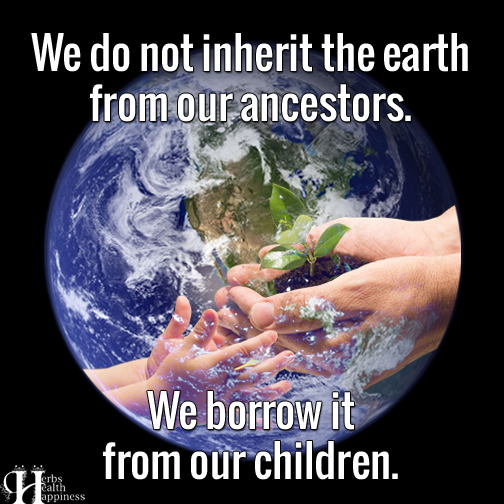
photo © Romolo Tavani | Fotolia
We do not inherit the earth from our ancestors; we borrow it from our children.
This famous quote is attributed to Native American sages of the old days. It’s a reminder that our actions have long term consequences and that these will not only influence our lifetimes but will affect those who come after us. It’s our responsibility to “pay into” that account rather than continue to draw from it.
This saying is also in a similar vein to the famous belief that our actions will influence the next seven generations. It encourages us to resist “short-termism” and to consider far into the future what the effects of our choices and acts will be.
The quote highlights the idea that we are not permanent stewards of the earth, but rather temporary caretakers who have a responsibility to pass it on to future generations in a healthy and sustainable state. It reminds us that the earth is not an infinite resource and that we must be mindful of our actions and their impact on the environment.
The quote also touches on the idea of intergenerational equity. It suggests that just as we have inherited the earth from our ancestors, we have a responsibility to pass it on to our children and future generations. We have a moral obligation to ensure that future generations have the same opportunities and access to the earth’s resources that we have had.
The quote reminds us that the earth is not a limitless resource, and that our actions have a direct impact on its health and sustainability. Pollution, deforestation, and overconsumption are examples of human activities that are having a negative impact on the earth. These activities not only affect the environment but also the health and livelihoods of millions of people around the world.
It’s important to remember that our actions today will have a direct impact on the earth’s ability to sustain future generations. We must take responsibility for our actions and make conscious choices to protect the earth.
In 2009, the biggest single report on the future of the planet served a warning to humanity. With the contributions of 2,700 experts worldwide, the report focuses on the dire effects of the global recession to the future of mankind. Researchers warn that global clean energy, food availability, poverty, and the growth of democracy worldwide will grow worse in the face of global recession. The emerging environmental security issues produced by climate change are also brought into attention, as “changes in weather patterns to loss of livelihood and disappearing states—has unprecedented implications for political and social stability.” Despite the grim vision of shortages and violence, it serves as a wake-up call to humanity “to move from its often selfish, self-centered adolescence to a more globally responsible adulthood.”
To quote Bertrand Russell: “The only thing that will redeem mankind is cooperation.” But in the 2014 article by Robert Savio, founder and president of the Inter Press Service, he expressed frustration on the unwillingness of some countries to invest in clean energy. Despite IPCC’s conclusive report that climate change is due to the action of man, to compromise is far too costly and unpractical for some. To paraphrase Savio, governments are still unable or unwilling to consider the future of mankind despite the evident threats of climate change.
😳 What Tinnitus Does To Your Brain Cells (And How To Stop It)
After 47 years of studies and countless brain scans done on more than 2,400 tinnitus patients, scientists at the MIT Institute found that in a shocking 96% of cases, tinnitus was actually shrinking their brain cells.
As it turns out, tinnitus and brain health are strongly linked.
Even more interesting: The reason why top army officials are not deaf after decades of hearing machine guns, bombs going off and helicopter noises…
Is because they are using something called "the wire method", a simple protocol inspired by a classified surgery on deaf people from the 1950s...
★ How To Get Rid Of Nail Fungus:
★ Does Your Salad Contain This Vegetable?
★ Top 10 Most Valuable Medicinal Herbs:





